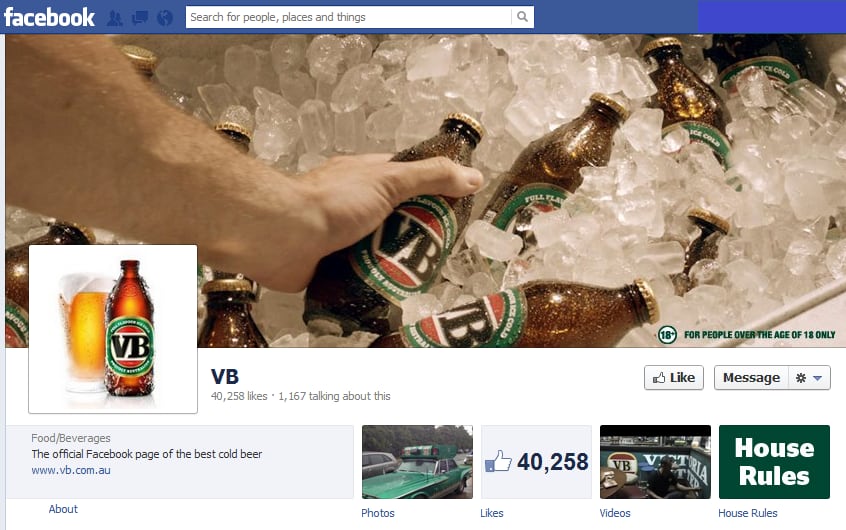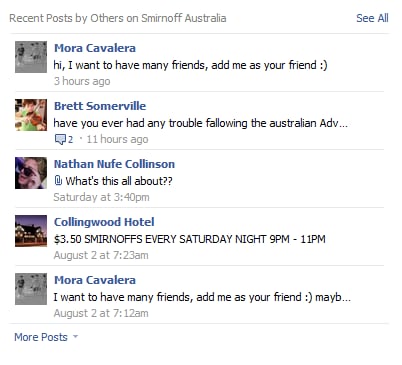The watchdog’s July 11 report also upheld other complaints relating to Foster’s Victoria Bitter Facebook page (below, reportedly by Queensland academics testing the ads code), on the grounds of discriminatory user comments in what it called the ‘advertisement’ relating to women and homosexuals.
Additionally, the board ruled that user content did not treat sex, sexuality or nudity with sensitivity to the relevant audience, due to a range of obscene posts, while the use of obscene language also breached its code.

In this respect the board was unimpressed with Foster’s Australia, Asia & Pacific's (Carlton United Breweries', CUB's) response that its user base was very comfortable with swearing and that almost no word was taboo.
Reacting to the ASB determination, CUB said: “Through this ruling, the Advertising Standards Bureau has, for the first time, determined that user comments are considered to be an ‘advertisement’ in relation to the AANA Code of Ethics."
But in its initial complaint response, CUB said it would be unduly onerous for brands to police user comments on Facebook as ad or marketing communications, since they lacked a reasonable degree of control over them.
Brands stuck in cleft stick?
“The only way for a producer to be certain that no inappropriate user comments appear on a Facebook page for its product would be...not to have that Facebook page at all,” CUB said.
But CUB said this commercially unsustainable given the importance of social media in marketing in 2012, but that the only alternative was to pre-moderate every comment in advance, which was “contrary to the spirit of social media and would cause users to become disengaged from the page”.
Meanwhile, another July 11 ruling on the same issue related to Diageo’s referral to the ASB following a similar raft of complaints relating to (1) sexist and racist ‘forms of discrimination and villification’ (2) irresponsible drinking and excessive consumption (3) obscene language depicting under 25s consuming alcohol.
Complainants also argued that (4) material on the Smirnoff page linked alcohol use to sexual/social success, while (5) the page was openly accessible to under 18s.
They wrote: “The Alcoholic Beverages Advertising Code (ABAC) presents itself as ‘media neutral’, and therefore also applies to brand activity on social media platforms.”
Comments as 'advertisements'
This implied that brands – in this case Victoria Bitter and Smirnoff – were responsible for consumer-created content on social media pages (comments on Smirnoff's Australia's Facebook page from today are pictured below) the complainants wrote, adding that a recent Australian Federal Court decision supported their view.

In Australian Competition and Consumer Commission v. Allergy Pathway (2011) the court ruled that health company Allergy Pathway was responsible for third-party Facebook and Twitter comments in its favor, in defiance of a court order that the firm could not make misleading product claims.
In response, Smirnoff said its Facebook page was a networking rather than an advertising tool (despite some Diageo paid-for advertising on the social network) and that that consumers who ‘liked’ the page generally already bought the spirit.
Smirnoff said it moderated comments by adults on images published on the page, but that “opinions or statements” posted to images by fans were not the view of Diageo, and fitted the Facebook spirit as an “honest, open channel for discussion not controlled or closed off by Diageo”.
Although it dismissed the other Smirnoff complaints, the ASB ruled: “The board considered that the Facebook site of an advertiser is a marketing communication tool over which the advertiser has a reasonable degree of control.
“As a Facebook page can be used to engage with consumers, the board further considered that the code applies to the content generated by advertisers as well as material or comments posted by friends.”
The ASB determination on VB is available here, while you can also read its Smirnoff ruling.
